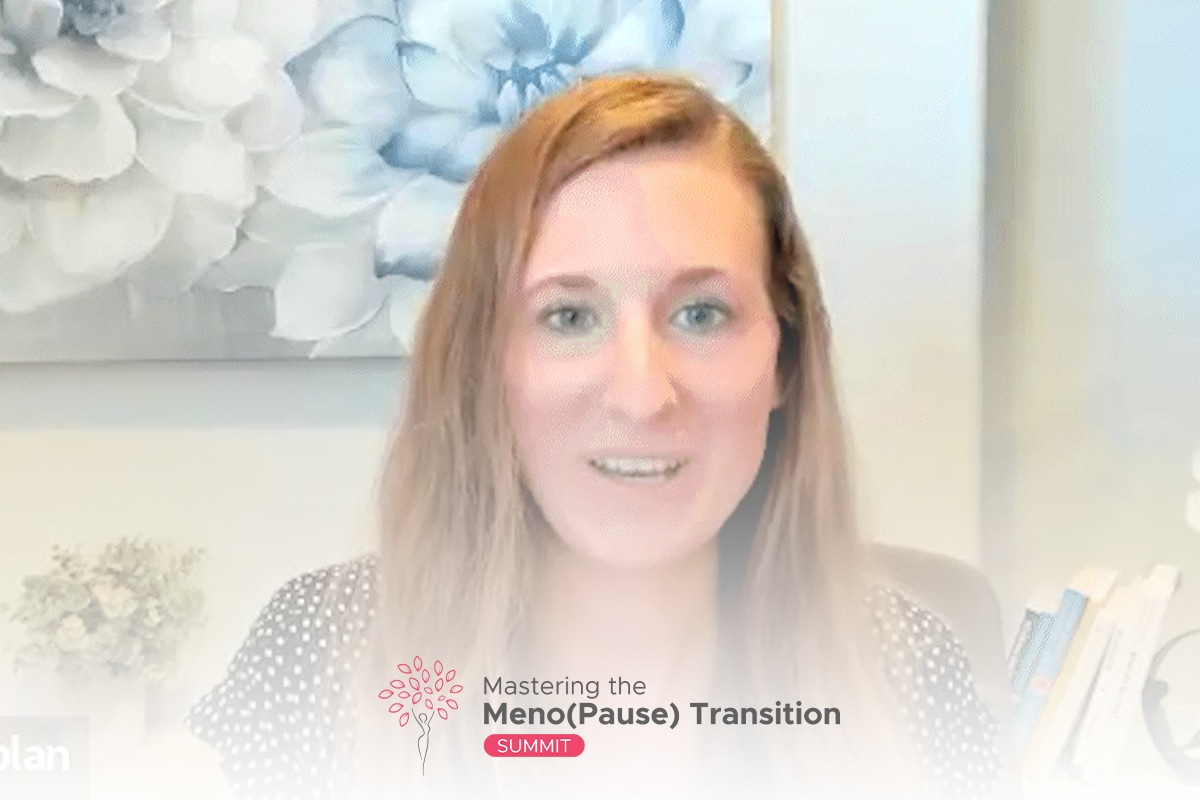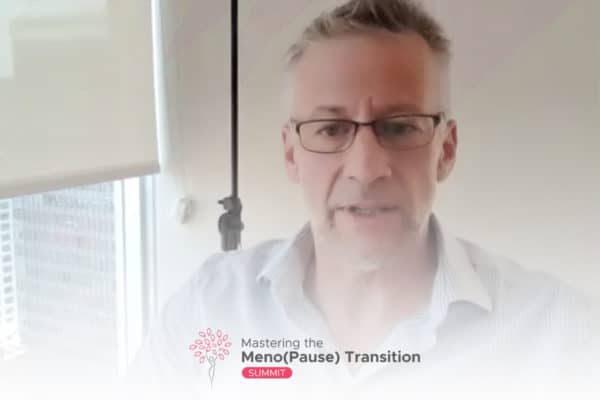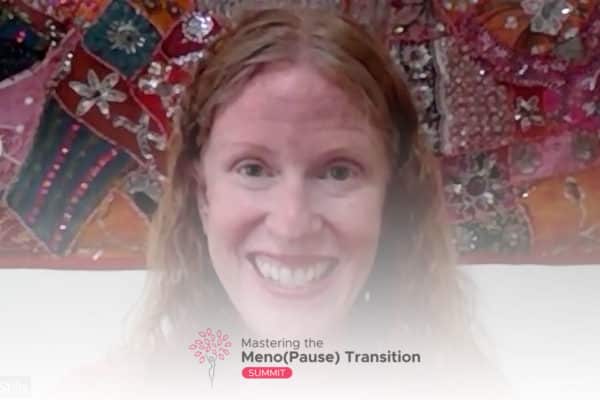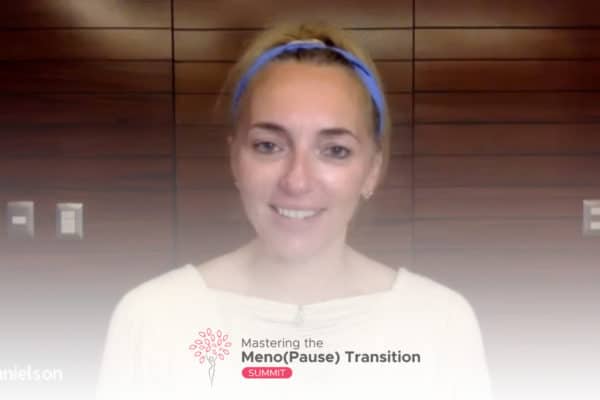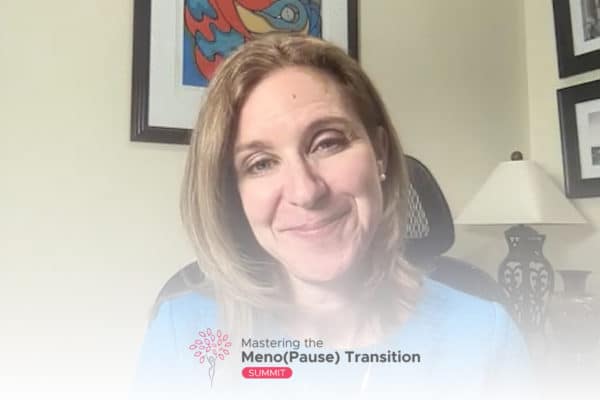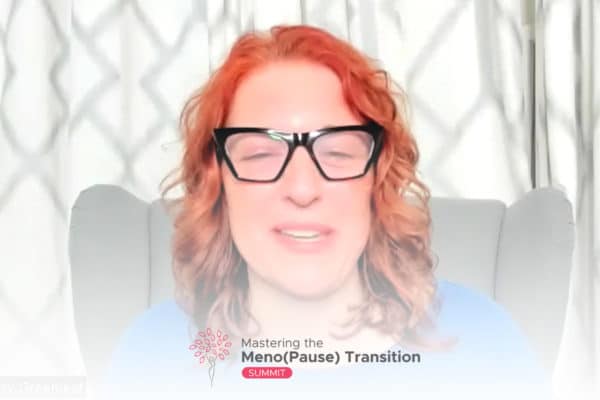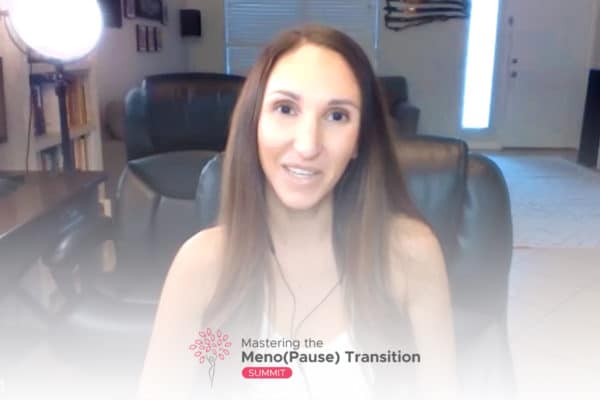Join the discussion below
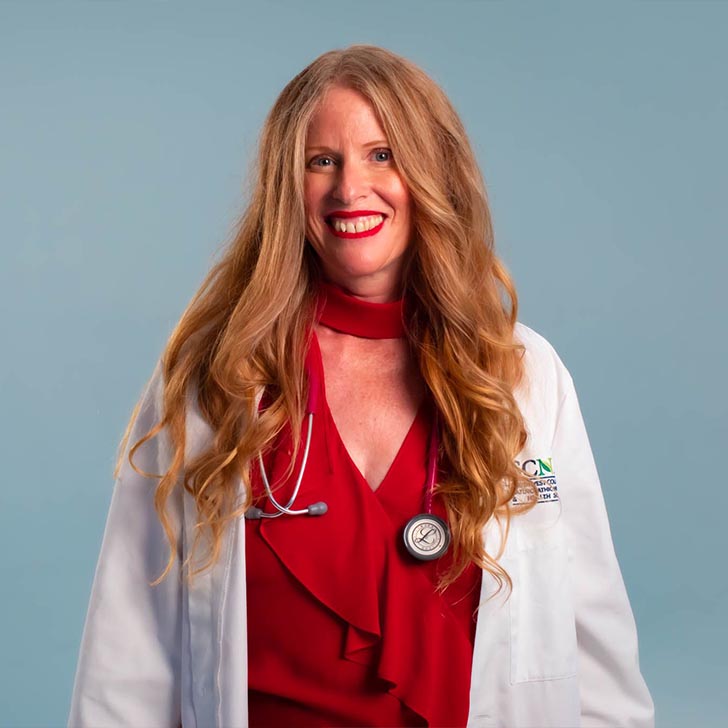
Dr. Sharon Stills, a licensed Naturopathic Medical Doctor with over two decades of dedicated service in transforming women’s health has been a guiding light for perimenopausal and menopausal women, empowering them to reinvent, explore, and rediscover their vitality and zest for life. Her pioneering RED Hot Sexy Meno(pause) Program encapsulates... Read More

Dr. Tiffany Caplan's passion for supporting people using functional medicine stems from her own health journey. She has also seen multiple family members diagnosed with autoimmunity after years of suffering from various, obscure ailments. Since then, she has been passionate about helping those with autoimmune conditions regain their health and... Read More
- What is autoimmunity?
- Hormone autoimmune connection
- How you can identify if hormones are at the root of your autoimmune condition
Dr. Sharon Stills
Hi ladies, welcome back to Mastering the Menopause Transition Summit. I’m your host, Dr. Sharon Stills. It’s great to have you all here. This has just been so much information, so many options, so many different paths and things for you to think about to help you in your hormone journey. And today, like always, we are gonna have a really important conversation because we haven’t talked about autoimmunity yet, and autoimmune disease is rampant and could be affecting you. You may already have been diagnosed with a autoimmune disease or maybe you know someone who was, and today we’re gonna tie it all together with Dr. Tiffany Caplan, who’s my guest, and we’re gonna talk about the connection between hormones and autoimmune disease, and why are women so prevalent in getting diagnosed with autoimmune disease and what you can do about it. So, Dr. Tiffany Caplan is here with me today, is a chiropractic physician and a functional medicine practitioner with a passion for helping people better understand and address complex chronic health conditions. Her passion for functional medicine stems from her own personal health journey. She started out as a patient of a functional medicine doctor while she was in graduate school, and she was then introduced into the world of autoimmunity, seeing many family members suffer from conditions such as Hashimoto’s and lupus, MS, Crohn’s, fibromyalgia, and she saw the need to educate people with autoimmune conditions on ways they can reclaim their health. She’s a best-selling author, and she is generously here with us today to share her knowledge, and I’m gonna ask her about her story ’cause I’m intrigued. So welcome, welcome to the summit and thanks for being here.
Dr. Tiffany Caplan
Thank you so much for having me. It’s a very important topic, and yeah, lots to talk about, so I’m excited, thank you.
Dr. Sharon Stills
Yeah, so I usually start by asking what is your story and your journey? How did you end up here? And it sounds like you have a very profound one, so I’d love if you’re willing to share it with the listeners.
Dr. Tiffany Caplan
Yeah, so I started out as a patient. I started to notice I was having problems with my own health, with brain fog, and anxiety and depression. I was becoming severely depressed. My schoolwork was suffering. I was like, “This is not me. What is going on?” And, of course, the conventional medicine model was like, “Here, just take this antidepressant,” so it kind of set me on my way. And then that’s when I was actually learning about functional medicine, kind of getting into like, “Oh, what is this other thing out there?” And I saw a functional doctor for myself. Like, “I think there’s something else going on. I don’t think I just have an SSRI deficiency. What is happening?” And she educated me on this whole world of functional medicine and how diet matters and lifestyle matters, and came to realize that my gut microbiome, I had a massive candida overgrowth in my gut and that was what was driving a lot of my health problems.
My cognitive decline and anxiety and everything was stemming from that and it was amazing to see, journey through that transition myself, kind of experiencing it firsthand. So that’s what got me into functional medicine, and then, like I said, kind of just family history of seeing people being diagnosed with these autoimmune conditions and just not educated on what autoimmunity was or anything that they could do about the situation. It was kind of just, “Here, take this medication and manage the symptoms,” and you’re gonna be like stuck with it for the rest of your life. And we were seeing autoimmune patients in our practice completely reverse or get into remission, and not have to rely on the medication management, or like, “Wow, this is something, I think, we need to teach more people about.” So kind of fast forward to where our practice is at now, but we’re helping people with getting into remission with autoimmune disease and I love it.
Dr. Sharon Stills
That’s fantastic, and those medications, I’m never a big fan of pharmaceuticals to begin with, but the pharmaceuticals they use for autoimmune disease have such a laundry list of harsh, harsh side effects, and so for anyone listening, if you are on those medications, this is for you. There is hope, there is remission. We’re not saying to jump off your medications today, but to find someone you can work with so you can get to the root causes like we’re gonna talk about, and hopefully feel better and not be worried about the detrimental effects. So for starters, for those listening, who really don’t know the definition, maybe they’ve heard it, but just to really, so we’re all in the same playing field, what is autoimmunity? How would you like to describe that?
Dr. Tiffany Caplan
Yeah, so autoimmunity is kind of a general umbrella term. It encompasses over, like, a hundred different diagnoses. So autoimmune diseases can range from things like more common rheumatoid arthritis, multiple sclerosis, Hashimoto’s, and then we also have eczema and psoriasis, and irritable bowel disease like Crohn’s and ulcerative colitis, and so it ranges. It’s systemic different problems, or they’re systemic autoimmune problems like lupus, which can attack multiple different tissues of the body, but, basically, what it comes down to is the immune system is having an abnormal reaction against self tissue, something in your body, so, naturally, the immune system’s supposed to fight off bacteria and viruses and things that can be harmful to you, but now it can start to attack your own tissues and cells and organs, and that’s when autoimmunity is diagnosed. So for somebody with, say, like, rheumatoid arthritis, the immune system is attacking their joints, or somebody with Hashimoto’s, it’s attacking their thyroid gland, or celiac, celiac, it’s attacking their gut, right? So it’s just whatever autoimmune diagnosis you may have, it’s labeled based on what tissue is being destroyed, but autoimmunity as a whole is the way we look at it, it’s an immune system problem, right?
Dr. Sharon Stills
Yes, when we attack ourselves, not a thing we want our immune system to be doing, but it’s so easy these days for the immune system to be confused. So let’s just jump in, and what is the connection for the women listening, who are like, “Well, I’m here about my hormones and menopause. What does this have to do with autoimmune?”
Dr. Tiffany Caplan
Yeah, so there’s some more direct connections, there’s indirect connections. So hormones, we think of as just the chemical messengers in the body that tell ourselves what to do, tell our body what to do, right? So whenever there’s mixed up messages, then there can be some problems that come from that. So when there’s an autoimmune component going on and the immune system is attacking self tissue, that doesn’t just happen for no reason. There’s gotta be something triggering it to do that, and hormones can be imbalanced and be one of the root causes causing the autoimmune destruction. So that’s where there’s like a direct connection. It could be triggering the immune system to do that. Also, where I see a lot of autoimmune issues start to appear in women are around periods of transitions where the hormones are changing. So like puberty, a lot of times I can trace back, when did some of the symptoms or issues start? Oh, maybe it was around puberty, or a pregnancy, or postpartum, or menopause, right? So as the hormones are fluctuating, it also has an impact on the immune system, and there can be those certain times where things can get triggered. So autoimmunity doesn’t just happen. There’s predisposing factors that lead up to it, and having hormonal imbalances can be one of those things that leads to developing an autoimmune problem, but can also be what’s still triggering the autoimmune reaction that’s happening in the body.
Dr. Sharon Stills
So are there specific hormone imbalances you see that lead to autoimmune issues more often than not?
Dr. Tiffany Caplan
Yeah, so the more common ones that we’ll see are gonna be things like insulin resistance, very common problem that we’ll find. And even people that don’t have diabetes, pre-diabetes, you’re gonna be insulin resistant without that. And I would actually say majority of my female autoimmune patients have reactive hypoglycemia. They get low blood sugars and that triggers insulin surges and they become insulin resistant from low blood sugar, so it’s not just a blood sugar thing, but insulin is a really common hormone that can trigger the immune system. Same thing with estrogen. So estrogen’s good, we need it, but it’s also one of the cases of too much of a good thing’s not a good thing. Too much estrogen is more pro-inflammatory and can be stimulatory to the immune system as well. And then we think of cortisol. I always look at cortisol, it’s the stress hormone in the body, it helps with regulating things like our energy and our sleep-wake cycle, and our blood sugar, but it’s also this resilience factor.
So how much stress our body can handle before it gets to that tipping point of triggering an abnormal reaction? And so cortisol, actually, is one of the more important ones when it comes to menopause as well because as we go through menopause and the ovaries are no longer producing, the manufacturers of our estrogen and testosterone and progesterone, our adrenals actually help take over the function of making those hormones. So when we are looking at, like, cortisol, it’s coming from the adrenal glands, and now all these other hormones can be coming from the adrenal glands in menopause, so there can be some imbalances happening with the adrenals and with cortisol. For example, progesterone is a precursor for cortisol. So if somebody’s body is under a lot of stress and really favoring making cortisol, you can become progesterone deficient. Even with normal estrogen levels, if there’s not enough progesterone to balance it out, that’s estrogen dominance in territory, right? So there can be imbalances happening because cortisol is off because your body’s under stress. So insulin and cortisol and estrogen, those are some of the top ones that I’ll see imbalanced. Of course, thyroid hormone matters for every cell in your body, too, so sometimes that’s off, but when it comes to triggering autoimmunity, I would say those are the top ones.
Dr. Sharon Stills
Yeah, it always just seems to come back to stress because in a perfect world, as you physiologically explained, the adrenals should pick up the slack and start producing hormones, but typically by the time we’re in the menopausal stage, our adrenals are not functioning as optimally as they should because we are a stressed out society, and as women, we tend to give and give and give, and so the adrenals always need extra love and attention as we’re going through our hormonal transition. And so for someone listening, do you find, in your practice, that hormones always are at the root cause, or do you find there are other issues?
Dr. Tiffany Caplan
Yeah, I mean, there’s usually not one root cause for autoimmunity. There’s usually multiple things going on because everything affects everything in the body. There really is no vacuum system where one system being out of place isn’t gonna affect everything else, which is, I think, why standard medicine isn’t as equipped to be able to handle something like autoimmunity because it’s so specialized and compartmented out. So hormones, yes, are really common root causes, but sometimes they’re kind of in the background and maybe they’re being affected by something else, and that’s why they’re causing some problems. Other big root causes of autoimmunity stem from our diet and lifestyle, like food sensitivities, reacting to food you’re consuming, having nutrient deficiencies, having toxins and chemical overload, exposures, having leaky guts and microbiome problems. Those are really common in the autoimmune triggers as well, or root causes. So, yeah, there’s not usually just one thing. It’s usually when one system’s dysfunctional, there’s multiple layers to it, and when it comes to autoimmunity, a big part of what triggers somebody to go from normal physiology into the autoimmune state is the abundance of too many stressors, and those are all different types of stressors. They’re physical, chemical stress, not just mental, emotional stress. So yeah, it’s the overload of different factors that lead to autoimmunity happening.
Dr. Sharon Stills
Yeah, it really is a huge, and I would add to that also overuse of medications and, specifically, antibiotic use can really be… I always think, sometimes we get sick, we get acutely ill, and the easy fix is to reach for an antibiotic and just make it all go away, but if you start to really think about and be more mindful about the things you’re doing and the choices you are making and the ramifications they have downstream that can be leading to autoimmune disease, maybe when you have something going on, you would make a different choice. With antibiotics, I think, they create cell wall deficient forms, and so they don’t always kill all the bacteria, and so then we have cells that are floating around the bacteria that no longer, they don’t have the cell wall, so the bacteria can’t be flagged by the immune system.
And I know, I see that in my practice, it’s a huge cause of autoimmune disease because then those cell wall deficient bacterias burrow into the tissues, and then we see autoimmune disease come up. Another thing I see frequently, which is really sad, is when someone is working on doing good for themselves, and they go and they have their amalgams removed to take care of, as you said, a toxic load, which definitely we know is a stressor and can provoke autoimmune disease, but they don’t do it with a biological dentist, and I see a large proportion of, especially rheumatoid arthritis, after improper amalgam removal, because then you’ve just exploded your mercury exposure. So friendly tip, it’s good to get your amalgams out, but make sure you do it with a biological dentist who knows what they’re doing.
Dr. Tiffany Caplan
Do it the right way.
Dr. Sharon Stills
So what are some of the ways you help someone discover if they have an autoimmune disease, or do they usually come to you already diagnosed?
Dr. Tiffany Caplan
Most people come to us already diagnosed. They’ve gone the traditional medicine model and kind of are frustrated by it by not getting answers or really getting help. They’re just in the medication management and looking for something different, but I do help people really figure out what they have going on. A lot of times diagnosing an autoimmune condition can take a long time. It’s, on average, about seven years of somebody having symptoms before they get a diagnosis, especially something like lupus, which is systemic autoimmune disease and has so many different things that have to show up for them to consider calling it that, that people suffer for years with symptoms and not knowing what’s going on with them. And that’s actually what led to us writing the book, “The Lupus Solution,” ’cause I had a family member go through the same thing, just kind of get pushed off by doctors, “Oh no, it’s nothing,” and ended up being lupus.
So kind of crazy, but I think most people come to us already knowing like, “Hey, I have an autoimmune diagnosis, and what do I do to help reverse it or get into remission?” And so then we work through, talking about your health history, getting an idea of where it might have started, what their root causes might be, what types of testing we might need to do, if we need to look at their hormones, if we need to look at their gut, if we need to check for certain areas of dysfunction for them, and then we do the right test to figure that out and get some answers for them. So that’s kind of where we start with patients that come to see us.
Dr. Sharon Stills
Mm, I think you’ve brought up such a good point about the health history, and anyone listening can even just sit down and start to map out their health history because often within your history, and especially when the onset of something, you can look back a year, even maybe two years, and see what was going on. Was there stress? Did you have a toxic exposure? Were you in an accident? And it can start to give you ideas of where things started to go awry, so that’s such a good point you brought up. And we always think of how we want fancy diagnostic testing, and I’m all for that, but sometimes just really sitting down and thinking about our history and what’s going on can really begin to give us clues. So how do you address? I’m sure you have a lot of listeners’ ears perked when you say remission, because if someone is listening, the standard, what you hear is you’re gonna have to live with this for the rest of your life, there’s no cure, there’s no anything. It’s meds forever. And so tell us about that because I’m sure there’s lots of listeners going, “Remission, oh my God, this is exciting. What do I do?”
Dr. Tiffany Caplan
Yeah, I mean, to kind of define what remission is, there really is no cure for autoimmunity. The mechanism behind autoimmunity is the immune system making these antibodies, memory cells, basically, to remember something. And when it’s remembering parts of your own body as being the bad guy, there’s no cure for that, but when we get into remission, remission means getting an immune system into a balanced state where it’s not actively causing that destruction, where it’s not actively flagging that tissue as being the bad guy. So that’s what we mean by remission. There’s no cure, but it’s a way to live your life without having the complications and the symptoms of the autoimmune process.
So that’s what we’re trying to get to. So to get to remission, I mean, it’s taking a health history, figuring out what are the root causes for the individual. Everybody is different. If I had five RA patients all lined up, they’re all gonna have different mechanisms behind why they got RA, and what they’re doing in their diet and their lifestyle that’s causing it. So learning your stressors, learning your triggers is a really good place to start to handle this. That’s what we help people identify and work through. So making the dietary lifestyle modifications that are gonna help them work through those different issues, whatever those are. Yeah, that’s kind of where we’ll start, but remission is possible with autoimmunity. So I always like to give people that hope, that they can do it, too. We’ve helped hundreds of people get into remission over the years.
Dr. Sharon Stills
So let’s talk a little bit about diet. Do you take everyone off of the major food sensitivities or how do you? We definitely talk about that. I hope by now everyone knows about gluten, and diary, and sugar, but I’m just curious what your take on it is.
Dr. Tiffany Caplan
Yeah, so the best way to figure out what foods like your body or don’t like your body is go through the elimination reintroduction process. So that is a good place that we always start with patients. If they have not done that before, we take the AIP diet type of approach, where we cut out the main players, the grains, the dairy, the sugar, of course, anything that’s processed. Other things like nightshades are sometimes a problem for people too, especially when they have rheumatoid type of issues going on. So we do an elimination of those main, the AIP type of diet protocol, and we do that for a minimum of three weeks, depending on where the person’s at, but that’s the half-life of those sensitivity reactions, when your immune system’s reacting to a food. It’s a reaction that’s about six weeks long, so we need to cut it out for at least the three weeks to see a difference. And then we reintroduce foods back in to test what the person is reacting to or not. And I mean, ultimately, we use the elimination diet as a tool. It’s not meant to be on for a long term, right? It’s not supposed to be a restricted diet that somebody follows forever because then we also see the problems with somebody being on a restricted diet, how it affects their microbiome, and their hormones, and everything else, right? The more you cut down your diet, the more problems there’s gonna be. So it’s just a tool to start with, but yeah, I find the elimination diet is a great place for most people to start.
Dr. Sharon Stills
Yeah, I think, if someone’s willing to do it ’cause it’s not for the faint-hearted to take all of these, the dairy and the eggs and the nuts and the gluten and the grains out of your diet. I know a lot of patients are often like, “Well, what am I gonna eat?” And there are things, you can eat vegetables and lean proteins and fruits, so there are things you can eat. I don’t know about you, but my experience is patients usually go kicking and screaming into it. And I have everyone do it for a minimum of 30 days, and by the end of the 30 days, when we’re having an appointment, I’m already ready ’cause they were fighting about having to give up this or that, and I’m ready to talk it out with them, and then they come in and they’re like, “Oh my God, I feel so great. I don’t even care about adding anything back in, I’m good, I love my new diet and I don’t need gluten.” And I think you mention grains, and I think that’s such a big…
A lot of people go gluten free, but then they’re still eating grains that are cross reacting, molecular mimicry, and they’re still having problems and you think you’re doing good. I just had this with a patient a few weeks ago, and some mother who has her son on this great diet and he’s off of gluten, but he is eating so many things that are cross reacting, and it’s like, “Ah, I don’t wanna tell you, but we have to really look at the rice and the,” all these other things. And so I know personally, when I went from everything to gluten free, it was awesome, but when I went from gluten free to grain free, it was like, “Oh,” it was so amazing. I don’t know if you see that with patients, too?
Dr. Tiffany Caplan
Yeah, I do, I always preface, too, the elimination diet, the hardest part’s the first week. If you get past the first week, then you got it down ’cause it’s just a learning curve, but people feel so much better cutting that stuff out. And yeah, a lot of people will notice, they won’t be that much of a difference going just gluten free ’cause they’re eating the gluten-free bread and pasta, and all the replacements, and cookies and stuff, but then they go grain free and there is usually a significant difference. And it’s not all grains, too. A lot of people are like, “Oh my God, I can never eat any grains again.” Most of the time you can pinpoint there’s certain ones that are problematic for you, but that’s why you do the process of eliminate and reintroduce, and then you can know for your body what it likes or doesn’t like. There’s really no bad foods necessarily. It’s just how your body’s reacting to them.
Dr. Sharon Stills
Exactly, so for someone who’s listening, who’s like, “Ooh, I wanna take this on,” when they reintroduce, can you just talk a little bit about the reintroduction process? So if someone listening is like, “I’m gonna take all these things out, but what do I do in a month?”
Dr. Tiffany Caplan
Yes, so when you’re reintroducing foods, you wanna do slow as you can, one variable at a time because food sensitivity is if you have an immune reaction to a food, a sensitivity reaction, the nature of it is delayed in response. So for some people that can be hours later or a couple days later, and then for some people like myself, it could be a week later. So sometimes those reactions are not very easy to catch and you need to try to do one variable at a time. I usually recommend starting out just one new food every three days or something, just to kind of get a feel for how the person reacts and how quickly, so if somebody does react really quickly to something, then maybe they can add foods a little quicker ’cause they can recognize within a day or so that they’re having a reaction. Personally, I was having reactions that were a week delayed when I first did the elimination diet, so it was a lot harder to figure out reintroducing things back in. It took me a while longer, but I think that’s kind of the exception, too. So I would say a few days between each new food, and as long as you can eat that food and not have any reactions, you should be able to keep it in your diet, but you wanna wait a few days to see if anything changes after adding it.
Dr. Sharon Stills
Yeah, I always say it’s like feeding a baby, feeding a newborn, right? You give them baked potatoes, and then you wait four days before you start to give them carrots or whatever to see, because of that delay. And then I think, at the end of the day, we’re all grown ups so you get to, if you wanna eat those eggs and you know you’re gonna get that migraine or that joint pain, that that’s your decision. I know when I was going through the process, we talk about, it sounds very easy. “Oh, just take those foods outta your diet,” but it can be challenging emotionally. And I remember, it took me a while. I would keep eating it and then I’d be like, “Oh, I feel horrible,” and then we have like amnesia and it looks so delicious, and then we eat it again and I’m like, “Oh, I feel horrible again,” and then you wanna beat yourself up. And so it’s really, really connecting it and deciding how do I wanna feel? And if you’re making that mindful decision, all right, this is gonna be so delicious, it’s gonna be worth the joint pain for the next three days, that’s your decision, but really, the process you’re talking about is so empowering ’cause it really puts you in charge of what you’re eating and how it’s affecting your body.
Dr. Tiffany Caplan
Yeah, oh gosh, that was totally me with chocolate. I was in denial for so long. I was like, “No way, chocolate can’t be giving me migraines.” It took me a long time, but what’s cool, too, is a lot of sensitivity is you can heal from, you can gain oral tolerance back to things. Now I can eat chocolate just fine, but I had to stay away from it for a couple years. So it’s like, it’s not a for everything. It’s a process, it’s a tool. I always tell people the elimination diet is a tool. It’s a way to figure things out. It’s not punishing you to make you take out all those foods. And sometimes it is harder before it gets easier, but it is totally worth it once you experience that relief of symptoms.
Dr. Sharon Stills
Hmm, yes, and really the, like you said in the beginning, “Oh, the doctor would never say your diet has anything to do with it.” And it really puts it into your being and experience about how much what we eat does affect us. It’s undeniable once you go through this process.
Dr. Tiffany Caplan
Yeah, definitely.
Dr. Sharon Stills
So what are, you mentioned the gut, so what are some things you find and do to help patients with gut issues and autoimmune issues?
Dr. Tiffany Caplan
Yeah, so the gut houses a lot of our immune system, somewhere like 80% or so. So it’s really a direct way we can influence the immune system, but it’s also influencing the immune system. So food sensitivities are a great example of that, but then there’s also leaky gut or leaky barrier. So when the barriers or the lining of the wall of the intestines are too permeable, there’s too much space or the cells aren’t as healthy, it doesn’t keep things from getting exposed to the immune system as much. So it puts our immune system in this hypervigilant state and that can drive the autoimmune process. So we look at doing, we do stool testing in our practice and we look at, if somebody has leaky gut, what are the things that are missing that are contributing to leaky gut? Is it just the food sensitivities and inflammation from the food that’s causing it, is it stress levels, is it toxins, are they having like microbiome problems that are causing it? So the stool testing also looks at the microbiome, and then we also look at digestion absorption.
So when it comes to food, it’s like you are what you eat, but really, you are what you can digest and absorb. So there’s a lot of digestion problems that people experience, especially people that are in fight or flight mode all the time, they’re stressed out all the time, they’re not feeling good. Chronically ill patients tend to have problems with digesting, and so we’ll see that that’s something we need to work on for people. And then tying in with hormones, too, if you have microbiome disruption, it can also influence your hormones. So there’s an enzyme in the gut called beta-glucuronidase, and when you produce too much of that, because maybe like you have too much bad bacteria or yeast or something, then that can cause you to reabsorb extra estrogen back into circulation. You can become estrogen dominant. So like our microbiome and our gut can also directly influence our hormones, and then that can influence our immune system, so it’s kind of all connected. Again, there’s no way to really separate these things out, but gut health is extremely important when it comes to autoimmunity.
Dr. Sharon Stills
Yeah, and I think, I know as soon as I see an ANA positive on a blood test, I’m like, “We’re doing a gut test,” and following it and seeing, and then if you see the permeability, the leakiness, I always work on healing that up first before really looking at the food sensitivities because I think someone who has leaky gut is gonna have so many food sensitivities, so I think it’s important for those of you listening, for whoever you’re working with, that you make sure it’s being done in that order, that your gut’s being addressed before, whether you’re doing the elimination diet or you’re doing food sensitivity testing. I personally really love the Zoomers. I think the Food Zoomers really do what they’re called, they zoom in and really look at the minute protein particles and can really pick up things more accurately than just a general food sensitivity test, but you really wanna be getting accurate information. So maybe you can eat eggs. To me, foods, I don’t think anyone really needs to eat dairy unless they’re baby cow.
Dr. Tiffany Caplan
I think you’re right.
Dr. Sharon Stills
And gluten is so, I don’t know your experience with your patients, but I know myself and my patients, when you go over to Europe, you can tolerate, right? Can you talk a little bit about that?
Dr. Tiffany Caplan
Yes, I see that all the time. People are so worried. They’re like, “Oh my God, I’m going on vacation. What can I eat?” And then they go to Europe and they’re eating all the bread and pasta and stuff, and they’re like, “Oh, this is great. I can eat this when I get home,” and then they eat it when they get home and they fall apart. It’s so different, how they have hybridized the wheat products and stuff in this country is crazy. It looks totally genetically different than what our body is used to recognizing as food, and so most people do not do well with especially gluten-containing grains, which how food has been changed. Even 20 years ago, it looked totally different.
Dr. Sharon Stills
Yeah, and all the glyphosate they’re spraying on it, triggering autoimmunity, which, glyphosate’s outlawed in many places, but not in the United States, so if you’re listening to this and you’re not in the United States, then you’re luckier in that aspect of things. But it is. I have a fond memory, and I do not… I had asthma as a child and I cured my asthma, initially, by just going off of gluten and dairy, which I had existed on my whole entire childhood, and I have a fond memory of being in the Louvre and eating a croissant and being fine. But I wanna circle back as you talked about digestion, and I think that’s, in some ways, such a simple piece, but such a profound piece when we’re talking about health and autoimmunity and hormone balance, because it is true, you aren’t really what you eat, you’re what you absorb with the foods you eat, and I find that hydrochloric acid deficiency is rampant. I find that many patients don’t have gallbladder sufficiency, they don’t have proper bile flow, they don’t have pancreatic flow, so I’m curious if you could just speak a little bit about that, what the listeners should be looking out for and what they can do.
Dr. Tiffany Caplan
Yeah, no, I see that all the time, and people, a lot of times, don’t have symptoms, or symptoms that they recognize, right? But that’s where it can get easily missed. And with something like hydrochloric acid, not having enough stomach acid, it looks like too much acid most of the time, right? So people get confused and they’re like on antacids and taking PPI medications and stuff, trying to block this too much acid that they have, but most of the time it’s not making enough. So a couple things that happen, if there’s not enough stomach acid, the food has to sit in the stomach a lot longer, so it’s like fermenting, that valve at the top of the stomach’s not being told to close, so there’s a reflux of things going back up the esophagus, and even if you don’t have the burning, indigestion, those symptoms, I find a lot of people have silent reflux. So that is happening and it’s irritating their throat and they’re getting lots of mucus or feeling like they have irritation or postnasal drip or different symptoms, and they don’t realize that that’s what it is. But a big part of, I think, where the connection between being autoimmune and having problems with making enough stomach acid and making enough pancreatic enzymes is the connection with the nervous system, right?
When the body’s under stress, it goes into fight or flight. You can’t be in fight or flight and rest and digest at the same time. You’re not gonna be making your enzymes and having good peristalsis and being able to absorb things if your body is tensed and stressed out in sympathetic state. So when the immune system is in that hypervigilant state, it also gets your nervous system to be there, and that’s where, I think, a lot of times we just need to work on the stress management with people, and getting them to calm down before they’re eating so that they actually benefit from their food more, or supplement, in the meantime, with something like hydrochloric acid or pancreatic enzymes or bile salts or whatever it may be that they’re missing. But yeah, digestion is a huge problem with people that have autoimmune. Another factor, though, too, if the foods aren’t being broken down well, they look foreign, right? When food gets to the small intestine to get absorbed, it’s supposed to be fully digested, and when it’s not, then it looks like something that could be harmful to you, and that’s where food sensitivities happen. So the more that you can digest, the more you’re gonna be able to tolerate food, too.
Dr. Sharon Stills
Such a good point. So before we finish, what are a couple of tips or tools for calming it down, like you say, for the listeners to relax so they can eat their food and digest and get into that parasympathetic state?
Dr. Tiffany Caplan
So you could do things that will stimulate the parasympathetics, the vagus nerve by doing different breathing exercises. One of my favorite breathing exercises to teach people is 4, 7, 8. So you breathe in for four, you hold it for seven, you let it out for eight, breathing out for twice as long is really stimulating that rest and digest mode of their nervous system. So something like that’s really easy, but just even being mindful when you eat. So many people are eating on the go, eating in their car, running and walking around and stuff, need to just sit down and take time to eat, and be mindful of the food that you’re putting in your mouth, taking time to actually chew your food. So many people just really are not chewing the 30 times they’re supposed to or whatnot. So just simple things like that, but I think as a big picture, just trying to figure out what other stressors you have control over, and that’s how you’re really going to get your nervous system out of the fight or flight response and out of autoimmunity, is by figuring out what are the stressors in your life that you have control over: the foods that you’re eating, the lifestyle habits that you’re leading. What are the things that you can change? That’s gonna tell your body, “Hey, it’s okay. We can calm down.” That’s a big part of it.
Dr. Sharon Stills
Mm, well, I certainly appreciate what you shared ’cause I am, in addition to being a physician, I’m a mindfulness teacher and I think mindfulness is the best medicine, and so I hope that those of you listening, even just taking one of the things that Dr. Tiffany said, ’cause sometimes I think we just hear these things, “Oh, you should chew your food,” and we hear you say it and it sounds like a good plan, but then we don’t actually implement it. So taking one of those things, whether it be committing to not eating on the go, or at the counter, or in the car, or actually chewing your food and just making that a practice and getting that down can have profound effects for your health. And it sounds so simple or maybe silly, but these things really work, doing the breathing exercises. These are the things that really promote health and really change your nervous system, so I love that you brought that up. Is there anything else about autoimmunity that we didn’t touch on that you wanna share with the listeners?
Dr. Tiffany Caplan
I think just being your own advocate. I just see so many people that, again, stuck in the conventional model of being told diet doesn’t matter, you can’t really do anything about this, it’s just your genetics, all the lies that lie around autoimmunity. I think people just need to educate themselves that, no, there is a lot more to it and that you can make changes, and just going through your own health history and figuring out when did you start to notice when things were wrong? What was going on around that time? And trying to connect the dots or working with a practitioner, too, to help figure out where things are stemming from. I think it’s just, yeah, people need to be aware that there is a lot more that they can do. When there’s symptoms present, symptoms are the way your body is communicating with you that there’s a problem, so pay attention.
Dr. Sharon Stills
And what about, I’m curious, your thoughts of emotions, and what’s the emotional aspect behind or along with autoimmunity?
Dr. Tiffany Caplan
Yeah, there was the ACE study, Adverse Childhood Experience study, where they did correlate people that have had childhood traumas with having a much higher risk of developing an autoimmune disease later in life. And I think what it goes down to is that whole, how your immune system and nervous system change when in trauma, go into fight or flight mode, and it’s a way that your body is trying to protect you, but it can start to have the wrong reactions, right? It can trigger your body being more hypersensitive to things you’re eating and getting exposed to, and start to develop that, all those predisposing factors to trigger an autoimmune disease to happen. So emotions are definitely, the mental/emotional state is definitely something that is a root cause of autoimmunity. Again, it’s usually there’s multiple layers and that’s part of it, and we mostly focus with people in the physical-chemical stressors that they have going on, but it’s also good to recognize that that childhood trauma, that neglect that you felt or abuse or whatever could have been what led you to this point, and working with a therapist or somebody to kind of unravel that is very helpful for some people.
Dr. Sharon Stills
Yeah, I think it’s important to also acknowledge that trauma can come, there’s capital T trauma, there’s little t trauma, and so to be kind to yourself because being ostracized at the basketball game could have changed the course of your life and how you think about yourself. And I think with autoimmune disease, when you think about it, it’s your own immune system attacking yourself, and so from an emotional perspective, where are you attacking yourself? Where are you beating yourself up? And it’s not to, could be very easy, if you are in that mode, to then beat yourself up for beating yourself up, and that is not why I’m bringing this up. There will be no self-flagellating here, but to just recognize and to start adapting. And as Dr. Tiffany says, absolutely, getting professional help, therapist, EMDR, whatever it is that works for you to start unraveling, but to start just consciously paying attention to how you talk to yourself.
Often, we are awfully nasty to ourselves, more nasty than we are to people we dislike or to anyone we interact with, and so starting to adapt a kinder, gentler communication and dialogue with yourself can really help you start to unravel the physical aspects as well. So do not beat yourself up. If you have an autoimmune disease, do not beat yourself up saying, “Oh my God, Dr. Stills just said I’m beating myself up.” It’s just to have an awareness. It’s just to breathe into it. You can do the 4, 7, 8 breathing, and just breathe through it, and allow yourself to shift. So some really great tips here and things that you can really start doing, the breathing, the chewing, the health history, the digestion, the elimination diet. So there’s lots of juicy nuggets to put into your menopause transition journey and try on and see what works for you. And I know, Dr. Tiffany told me she’s got a free gift for those of you listening. Could you just tell us what it is?
Dr. Tiffany Caplan
Yeah, so we have an autoimmune recipe book ’cause, again, everybody is like, “What do I eat when I have autoimmunity?” So we have some safe recipes that people can, it can kind of ease people into eating healthier, so it’s a good little resource, and we’d like to give that to everybody that’s attended.
Dr. Sharon Stills
I love that, thank you. And yes, I know recipes are often sought after, so that’s a fantastic thing to help because it can be overwhelming. “Well, what do I eat now?” if you’re used to only eating one way or cooking one way, but again, if you can shift the perception and look at it as a journey, a journey towards health, something new you’re gonna learn, something fun. What can you discover? Being curious about it. It can be a nice process to change your diet and give yourself that gift of healing nutrition, so thank you for that, and thank you for being here and for giving your information and hope, and I just appreciate you taking the time. And to everyone else, as I just mentioned, you’ve got lots of little tidbits, so take what works for you or what calls to you and you wanna get started with, and really try it on. Even, as I said, the chewing, go on a journey of 30 days of committing to chew, remembering that you’ll probably finish a meal and be like, “Oh my God, I forgot to chew that meal,” but that’s okay. Do it for 30 days and keep reminding yourself until it turns into something that you are regularly doing, and watch the difference in your digestion, watch the difference in how you’re feeling. So we’ll be back again. Until then, be well, and we’ll see you soon.
Downloads

